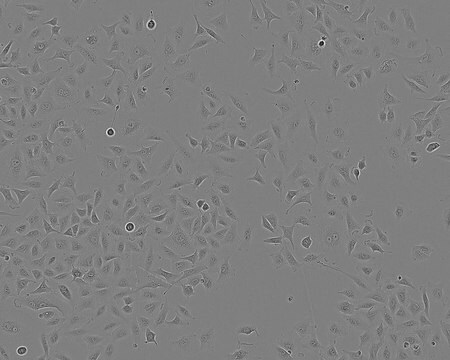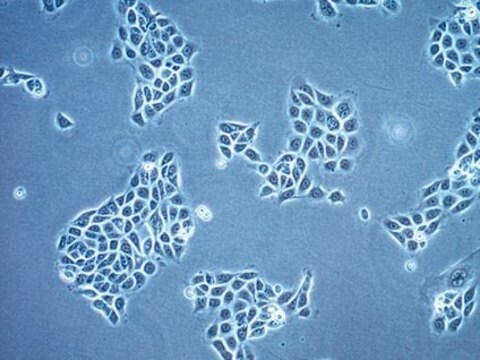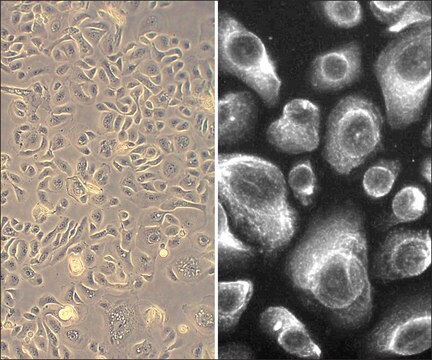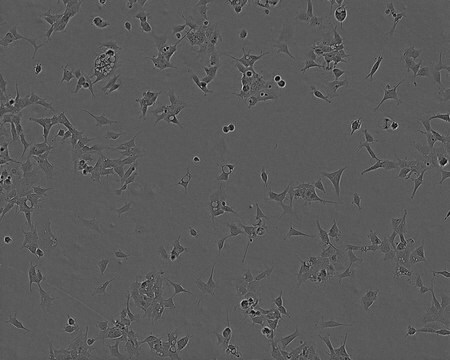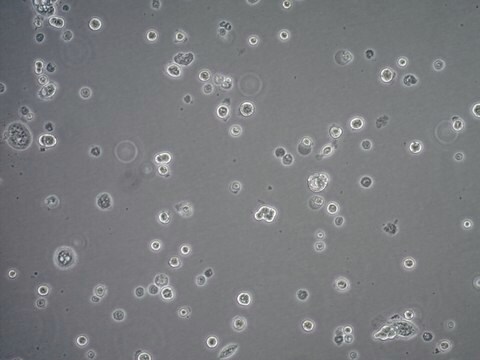95102433
BEAS-2B Cell Line human
Anmeldenzur Ansicht organisationsspezifischer und vertraglich vereinbarter Preise
Alle Fotos(1)
About This Item
UNSPSC-Code:
41106514
Empfohlene Produkte
Biologische Quelle
human lung
Beschreibung
Human bronchial epithelium, normal
Form
liquid
Wachstumsmodus
Adherent
Karyotyp
Not specified
Morphologie
Epithelial-like
Produkte
Not specified
Rezeptoren
Not specified
Methode(n)
cell culture | mammalian: suitable
Versandbedingung
dry ice
Lagertemp.
−196°C
Ursprung der Zelllinie
Human bronchial epithelium, normal
Beschreibung der Zelllinie
BEAS-2B cells were derived from normal bronchial epithelium obtained from autopsy of non-cancerous individuals. Cells were infected with a replication-defective SV40/adenovirus 12 hybrid and cloned. Squamous differentiation can be observed in response to serum. This ability can be used for screening chemical and biological agents inducing or affecting differentiation and/or carcinogenesis. The cell line has been applied for studies of pneumococcal infection mechanisms. BEAS-2B was described to express keratins and SV40 T antigen. Subculturing the cells before confluency is necessary as confluent cultures rapidly undergo squamous terminal differentiation.
Anwendung
BEAS-2B Cell line has been used to study differentiation of squamous cells and effect of biological and chemical agents on differentiation.
DNA-Profil
STR-PCR Data: Amelogenin: X,Y
CSF1PO: 9,12
D13S317: 13
D16S539: 12
D5S818: 12,13
D7S820: 10,13
THO1: 7,9.3
TPOX: 6,11
vWA: 17,18
CSF1PO: 9,12
D13S317: 13
D16S539: 12
D5S818: 12,13
D7S820: 10,13
THO1: 7,9.3
TPOX: 6,11
vWA: 17,18
Nährmedium
BEGM, also known as LHC-9 with modification (available from Clonetics Corporation, CC3171 (BEBM) plus additives CC4175 or BEGM Bullet Kit, CC3170); Note: Additives supplied contain gentamycin which has been omitted for culture at ECACC; media is serum-free.
Subkultur-Routine
Passage sub-confluent cultures using 0.25% trypsin or trypsin/EDTA. Incubate at room temperature for 5-10 min until cells detach. Add fresh medium and disperse cells, centrifuge and resuspend pellet in medium. Seed into new flasks at 1500 to 3000 cells per cm2. Flasks have to be precoated with a mixture of 0.01 mg/ml fibronectin, 0.03 mg/ml collagen and 0.001 mg/ml bovine serum albumin dissolved in BEGM. Add mixture at ratio of 0.2 ml per cm2 surface area. Incubate at 5% CO2, 37°C for at least 6 hours at 37oC. Remove excess fluid and allow flasks to dry by incubating at 37oC overnight, leaving the caps loose. Prior to addition of cells wash flask three times with PBS. Note: BEGM medium is almost serum-free, therefore trypsin inhibitor is essential. Add an equal or greater volume of trypsin inhibitor as trypsin used before, centrifuge and reseed cells in collagen coated flasks using culture medium.
Sonstige Hinweise
Additional freight & handling charges may be applicable for Asia-Pacific shipments. Please check with your local Customer Service representative for more information.
Cultures from HPA Culture Collections and supplied by Sigma are for research purposes only. Enquiries regarding the commercial use of a cell line are referred to the depositor of the cell line. Some cell lines have additional special release conditions such as the requirement for a material transfer agreement to be completed by the potential recipient prior to the supply of the cell line.
Please view the Terms & Conditions of Supply for more information.
Cultures from HPA Culture Collections and supplied by Sigma are for research purposes only. Enquiries regarding the commercial use of a cell line are referred to the depositor of the cell line. Some cell lines have additional special release conditions such as the requirement for a material transfer agreement to be completed by the potential recipient prior to the supply of the cell line.
Please view the Terms & Conditions of Supply for more information.
Haftungsausschluss
RESEARCH USE ONLY. This product is regulated in France when intended to be used for scientific purposes, including for import and export activities (Article L 1211-1 paragraph 2 of the Public Health Code). The purchaser (i.e. enduser) is required to obtain an import authorization from the France Ministry of Research referred in the Article L1245-5-1 II. of Public Health Code. By ordering this product, you are confirming that you have obtained the proper import authorization.
Lagerklassenschlüssel
10 - Combustible liquids
WGK
WGK 3
Flammpunkt (°F)
Not applicable
Flammpunkt (°C)
Not applicable
Analysenzertifikate (COA)
Suchen Sie nach Analysenzertifikate (COA), indem Sie die Lot-/Chargennummer des Produkts eingeben. Lot- und Chargennummern sind auf dem Produktetikett hinter den Wörtern ‘Lot’ oder ‘Batch’ (Lot oder Charge) zu finden.
Besitzen Sie dieses Produkt bereits?
In der Dokumentenbibliothek finden Sie die Dokumentation zu den Produkten, die Sie kürzlich erworben haben.
An antagonist of the platelet-activating factor receptor inhibits adherence of both nontypeable Haemophilus influenzae and Streptococcus pneumoniae to cultured human bronchial epithelial cells exposed to cigarette smoke
Shakti D Shukla
International Journal of Chronic Obstructive Pulmonary Disease, 11 (2016)
Induction of altered mRNA expression profiles caused by fibrous and granular dust
Simone Helmig
Molecular Medicine Reports (2013)
J E Adamou et al.
Infection and immunity, 66(2), 820-822 (1998-02-07)
Pneumococcal adherence to alveolar epithelial cells and nasopharyngeal epithelial cells has been well characterized. However, the interaction of Streptococcus pneumoniae with bronchial epithelial cells has not been studied. We have now shown that pneumococci bind specifically to a human bronchial
The Expression of the Ubiquitin Ligase SIAH2 (Seven In Absentia Homolog 2) Is Increased in Human Lung Cancer
Paula Moreno
PLoS ONE (2015)
Proinflammatory effects and oxidative stress within human bronchial
epithelial cells exposed to atmospheric particulate matter (PM2.5 and
PM>2.5) collected from Cotonou, Benin
epithelial cells exposed to atmospheric particulate matter (PM2.5 and
PM>2.5) collected from Cotonou, Benin
Boris Fresnel Cachon
Environmental Pollution (Barking, Essex : 1987) (2014)
Unser Team von Wissenschaftlern verfügt über Erfahrung in allen Forschungsbereichen einschließlich Life Science, Materialwissenschaften, chemischer Synthese, Chromatographie, Analytik und vielen mehr..
Setzen Sie sich mit dem technischen Dienst in Verbindung.